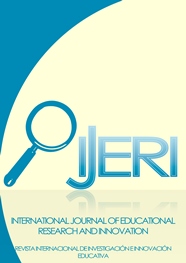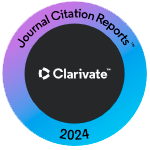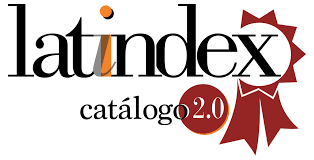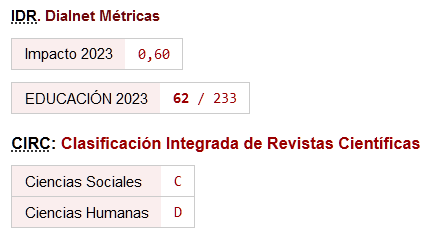¿Cómo aprendieron los futuros maestros de escuela primaria en Indonesia la educación para la ciudadanía durante la pandemia de Covid 19?
DOI:
https://doi.org/10.46661/ijeri.5329Palabras clave:
Covid-19, Educación para la ciudadanía, IndonesiaResumen
Numerosos problemas como el resultado de la pandemia de Covid-19 han continuado apareciendo en varios sectores a medida que se propaga rápidamente. En el sector educativo, los estudiantes ya no pueden estudiar libremente en el aula e incluso ir a la escuela a estudiar. En este caso, cambiar la forma de aprender es una forma de coherencia para educarlos en diversas situaciones y condiciones, especialmente durante la pandemia de Covid-19. En este estudio, investigamos cómo la respuesta de los estudiantes a través de futuros maestros de escuela primaria en Indonesia para aprender Educación para la Ciudadanía que se implementó de forma remota en casa con un esquema de aprendizaje en línea durante la pandemia Covid-19. Utilizamos el método de investigación cualitativa y cuantitativa en este estudio. Para recopilar datos, utilizamos cuestionarios distribuidos a 508 estudiantes en la Región Especial de Yogyakarta, Ciudad de Bandung, Ciudad de Cirebon, Provincia de Java Occidental mediante el uso de Google Form. Además, también realizamos algunas entrevistas con varios estudiantes utilizando una aplicación en línea para obtener datos válidos. Según la investigación, hubo buenas y malas actitudes de aprendizaje de los estudiantes en el curso de Educación para la Ciudadanía. Una buena actitud de aprendizaje de los estudiantes se mostró por el entusiasmo en el video basado en el aprendizaje, mientras que la mala actitud de los estudiantes se muestra por la falta de efectividad en la comprensión del concepto de Educación para la Ciudadanía.
Descargas
Citas
Association, S. E. G. for C. of the E. of N. C. P. of the C. P. M. (2020). An update on the epidemiological characteristics of novel coronavirus pneumonia (COVID-19). Zhonghua liu xing bing xue za zhi = Zhonghua liuxingbingxue zazhi, 41(2). https://doi.org/10.3760/cma.j.issn.0254-6450.2020.02.002
Awidi, I. T., Paynter, M., & Evers, U. (2019). Visual Organizers and Scaffolding the Student Learning Experience in Higher Education. Journal of Educational Technology Systems, 48(4), 518–538. https://doi.org/10.1177/0047239519893051
Barkur, G., Vibha, & Kamath, G. B. (2020). Sentiment analysis of nationwide lockdown due to COVID 19 outbreak: Evidence from India. Asian Journal of Psychiatry, 51, 1-2. https://doi.org/10.1016/j.ajp.2020.102089
Buzzard, C., Crittenden, V. L., Crittenden, W. F., & McCarty, P. (2011). The Use of Digital Technologies in the Classroom: A Teaching and Learning Perspective. Journal of Marketing Education, 33(2), 131–139. https://doi.org/10.1177/0273475311410845
Chen, H.-L., Vicki Widarso, G., & Sutrisno, H. (2020). A ChatBot for Learning Chinese: Learning Achievement and Technology Acceptance. Journal of Educational Computing Research, 58(6), 1161–1189. https://doi.org/10.1177/0735633120929622
CNN Indonesia. (2020). Kemendikbud Buat Skenario Belajar di Rumah sampai Akhir 2020. CNN Indonesia. Diambil dari. Retrieved from: https://www.cnnindonesia.com/nasional/20200424114337-20-496861/kemendikbud-buat-skenario-belajar-di-rumah-sampai-akhir-2020
Darmawan, C. (2015). Legislative Strengthening and Empowerment: Efforts to Strengthen Local Governance and Accountability through Provincial Parliaments in Indonesia. American Journal of Applied Sciences, 12, 802–809. https://doi.org/10.3844/ajassp.2015.802.809
Delgado-Algarra, E., Román-Sánchez, I., Olmedo, E., & Lorca Marín, A. (2019). International MOOC Trends in Citizenship, Participation and Sustainability: Analysis of Technical, Didactic and Content Dimensions. Sustainability, 11. https://doi.org/10.3390/su11205860
Fraenkel, J. L., Wallen, N. E., & Hyun, H. H.. (2012). How to design and evaluate research in education eighth edition. New York: Mc Graw Hill.
Ellahi, A., & Zaka, B. (2015). Analysis of Higher Education Policy Frameworks for Open and Distance Education in Pakistan. Evaluation Review, 39(2), 255–277. https://doi.org/10.1177/0193841X15570046
Emo, K., Emo, W., Kimn, J.-H., & Gent, S. (2015). The Complex Experience of Learning to Do Research. Journal of Experiential Education, 38(4), 339–353. https://doi.org/10.1177/1053825915578913
Fegert, J. M., Vitiello, B., Plener, P. L., & Clemens, V. (2020). Challenges and burden of the Coronavirus 2019 (COVID-19) pandemic for child and adolescent mental health: a narrative review to highlight clinical and research needs in the acute phase and the long return to normality. Child and Adolescent Psychiatry and Mental Health, 14(1), 20. https://doi.org/10.1186/s13034-020-00329-3
Hidayah, Y., Sapriya, Darmawan, C., Malihah, E., & Karliani, E. (2020). Promoting Civic Intelligence in Applied Science to Promote Interaction between Science: An Overview in the Perspective of Citizenship Education. Universal Journal of Educational Research, 8(8), 3782–3791. https://doi.org/10.13189/ujer.2020.080859.
Hidayah, Y., Sapriya, S., Darmawan, C., & Malihah, E. (2020). Student Organizations as Voluntary Groups in Tertiary Education: Enculturation and Balancing Political Engagement for Indonesian Generation Z. he International Journal of Civic, Political, and Community Studies, 18(1). https://doi.org/10.18848/2327-0047/CGP/v18i01/1-12
Jackson, M., & Shenton, A. K. (2010). Independent learning areas and student learning. Journal of Librarianship and Information Science, 42(4), 215–223. https://doi.org/10.1177/0961000610380821
Lakin, J. L., & Wichman, A. L. (2005). Applying Social Psychological Concepts outside the Classroom. Teaching of Psychology, 32(2), 110–113. https://doi.org/10.1207/s15328023top3202_7
Lowerison, G., Sclater, J., Schmid, R. F., & Abrami, P. C. (2006). Are We Using Technology for Learning? Journal of Educational Technology Systems, 34(4), 401–425. https://doi.org/10.2190/ER58-3H7P-Y8FK-U8F7
Mahato, S., Pal, S., & Ghosh, K. (2020). Effect of lockdown amid COVID-19 pandemic on air quality of the megacity Delhi, India. Science of The Total Environment, 730, 139086. https://doi.org/10.1016/j.scitotenv.2020.139086
Miller, B., & Rector, C. (2002). Distance Learning in a School Nurse Credential Program. The Journal of School Nursing, 18(6), 338–345. https://doi.org/10.1177/10598405020180060601
Morgul, E., Bener, A., Atak, M., Akyel, S., Aktaş, S., Bhugra, D., … Jordan, T. R. (2020). COVID-19 pandemic and psychological fatigue in Turkey. International Journal of Social Psychiatry, 0020764020941889. https://doi.org/10.1177/0020764020941889
Murphy, J., & Lebans, R. (2009). Leveraging New Technologies for Professional Learning in Education: Digital Literacies as Culture Shift in Professional Development. E-Learning and Digital Media, 6(3), 275–280. https://doi.org/10.2304/elea.2009.6.3.275
Nagro, S. A., Fraser, D. W., & Hooks, S. D. (2018). Lesson Planning With Engagement in Mind: Proactive Classroom Management Strategies for Curriculum Instruction. Intervention in School and Clinic, 54(3), 131–140. https://doi.org/10.1177/1053451218767905
Parji, & Feriandi, Y. A. (2020). Development of Student Participation Instruments in Politics for Civic Education Learning in the University. Universal Journal of Educational Research, 8(8), 3679–3689. https://doi.org/10.13189/ujer.2020.080847.
Poudel, K., & Subedi, P. (2020). Impact of COVID-19 pandemic on socioeconomic and mental health aspects in Nepal. International Journal of Social Psychiatry, 0020764020942247. https://doi.org/10.1177/0020764020942247
Rifai, A. (2016). Learning through Immersive Study: Contextualizing Music in the Elementary Music Classroom. Music Educators Journal, 103(1), 34–40. https://doi.org/10.1177/0027432116655198
Riyanto, A. (2007). Pancasila Dasar Negara Indonesia. Junal Hukum dan Pengembangan, 37 (3), 457-493.
Sanner, B., & Bunderson, J. S. (2015). When feeling safe isn’t enough: Contextualizing models of safety and learning in teams. Organizational Psychology Review, 5(3), 224–243. https://doi.org/10.1177/2041386614565145
Scagnoli, N. (2009). A Review of Online Learning and its Evolution in Latin America. Policy Futures in Education, 7(5), 555–565. https://doi.org/10.2304/pfie.2009.7.5.555
Shuell, T. J., & Farber, S. L. (2001). Students’ Perceptions of Technology Use in College Courses. Journal of Educational Computing Research, 24(2), 119–138. https://doi.org/10.2190/YWPN-H3DP-15LQ-QNK8
Tanu Wijaya, T. (2020). How chinese students learn mathematics during the coronavirus pandemic. IJERI: International Journal of Educational Research and Innovation, 15, 1–16. https://doi.org/10.46661/ijeri.4950
Tolstenko, A., Baltovskij, L., & Radikov, I. (2019). Chance of Civic Education in Russia. SAGE Open, 9(3), 2158244019859684. https://doi.org/10.1177/2158244019859684
Upvall, M. j., Decker, I., & Wilkerson, E. (2000). Essentials of a successful distance-learning experience. NT Research, 5(3), 215–225. https://doi.org/10.1177/136140960000500309
Wahab, A. A., & Sapriya. (2011). Teori dan Landasan Pendidikan Kewarganegaraan. Bandung: CV Alfabeta.
Westheimer, J., & Kahne, J. (2004). Educating the “Good” Citizen: Political Choices and Pedagogical Goals. PS: Political Science & Politics, 37(2), 241-247. doi:10.1017/S1049096504004160
Winataputra, U. S., & Budimansyah., D. (2017). Civic Education, Konteks, Landasan, Bahan Ajar dan Kultur Kelas. Bandung: UPI.
You, Y. (2020). Learning Experience: An Alternative Understanding Inspired by Thinking Through Confucius. ECNU Review of Education, 3(1), 66–87. https://doi.org/10.1177/2096531120904247
Yuen, T. W. W. (2016). Civic education stuck in a quagmire: A critical review of civic education in Hong Kong? Citizenship, Social and Economics Education, 15(2), 69–82. https://doi.org/10.1177/2047173416650447
Descargas
Publicado
Cómo citar
Número
Sección
Licencia
Derechos de autor 2020 Yayuk Hidayah, Lili Halimah, Meiwatizal Trihastuti, Dinie Anggraeni Dewie, Yoga Ardian Feriandi, Dianasari Dianasari

Esta obra está bajo una licencia internacional Creative Commons Atribución-NoComercial-SinDerivadas 4.0.











